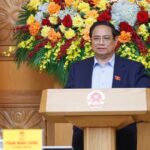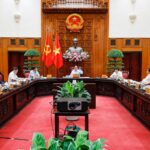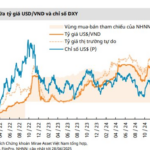An Urgent Need for Private Sector Legislation
On May 11th, Party General Secretary To Lam published an article titled “New Impetus for Economic Development”. He urged Vietnam to promptly study and develop a Law on Private Sector Economic Development and amend relevant regulations to fully institutionalize the resolutions in Resolution 68.
The proposal to study and develop a Law on Private Sector Economic Development is a first. In an interview with Tien Phong , TS. To Hoai Nam, Vice President and General Secretary of the Vietnam Association of Small and Medium-sized Enterprises (VINASME), affirmed the urgency of this request in the current context, promoting the private sector as the most important driving force of the economy.

TS. To Hoai Nam, Vice President and General Secretary of VINASME.
According to Mr. Nam, regulations related to the private sector are scattered across various documents, including Party resolutions, National Assembly resolutions, the Law on Investment, the Law on Competition, the Law on Enterprises, and the Law on Supporting Small and Medium-sized Enterprises. This poses challenges in application, especially for small and medium-sized enterprises. It also makes it difficult for state agencies to provide support and reference relevant regulations.
“A specialized law on private sector development is necessary to systematize the regulations, creating a clear, transparent, and easily implementable legal corridor; eliminating contradictions and overlaps,” emphasized Mr. Nam.
The private sector currently contributes approximately 50% of GDP, but according to Mr. Nam, this sector still faces numerous difficulties and limitations, especially in terms of access to capital and administrative procedures, as well as “discriminatory” treatment. “It is essential to affirm that there are no provisions or terms in the normative legal documents that indicate any discrimination. However, in the process of implementation, in behavior or perception, there are still elements that put private enterprises at a disadvantage,” said Mr. Nam. He illustrated this point by referring to the inequality between private enterprises and state-owned enterprises or foreign-invested enterprises (FDI).
Regarding access to land , Mr. Nam pointed out that most land rental incentives and tax breaks are exclusively offered to FDI enterprises or large-scale projects. Domestic private enterprises often face higher land rental costs and greater challenges in acquiring clean land.

The private sector contributes approximately 50% of GDP.
The Vice President of VINASME emphasized the need for a law to create a fair environment for the private sector to access resources such as land, capital, and business opportunities, as well as participate in key projects and infrastructures. He also highlighted the importance of nullifying unfavorable regulations, such as the directive orientation in the newly issued Resolution 68, resolving disputes, protecting the legitimate rights and interests of enterprises, and countering unfair competitive practices. Additionally, the law should encourage the private sector to embrace innovation, digital transformation, and entrepreneurship linked to innovation and circular economy. To stay competitive, the new law must incorporate these contemporary trends.
“It is necessary to comprehensively review all laws, resolutions, and regulations related to the private sector,” suggested Mr. Nam. “The Law on Private Sector Economic Development should focus on overall policies, while specialized laws can provide detailed regulations in specific fields.”
A Vital Driving Force for the Economy
As a representative of the small and medium-sized enterprise community, the Vice President of VINASME expressed his hope that the Law on Private Sector Economic Development would be promptly issued, fully institutionalizing the resolutions in Resolution 68. He aspires for the private sector to become one of the most crucial driving forces of the national economy. By 2030, this sector is expected to contribute approximately 55-58% of GDP, 35-40% of the total state budget revenue, and provide employment for about 84-85% of the total social labor force. The nation’s competitiveness will be enhanced through the development of robust private economic groups.
A transparent business environment is expected to attract additional domestic and international investment, unleashing productive forces. “How can we ensure that people feel confident enough to invest in business ventures instead of speculating in real estate or hoarding gold, expecting price increases?” Mr. Nam pondered.

A transparent business environment is expected to attract additional investments.
Mr. Phan Duc Hieu, a member of the National Assembly’s Committee on Economics and Finance, emphasized that the institutionalization of the resolution must not be prolonged and should be conducted swiftly, vigorously, and robustly.
“I hope that the institutionalization of this resolution will be clear and concise,” said Mr. Hieu. “People are only concerned about whether Resolution 68 has been clearly implemented, so why is the institutionalization process so slow and detached from their daily lives?” He cited the immediate need to eliminate at least 30% of unnecessary investment and business conditions.
In reality, there are nearly 200 business lines and sectors that are subject to investment and business conditions managed by various ministries and sectors. To align with the spirit of the resolution, at least 30% of unnecessary conditions should be eliminated, thereby reducing unnecessary “sub-licenses.”
“Dr. Nguyen Van Dinh: Resolution 68 Becomes a ‘Revolution’ for the Real Estate Market”
“The renowned academic, Dr. Nguyen Van Dinh, highlights the groundbreaking nature of Resolution 68, describing it as a ‘true revolution in mechanism’. This resolution marks a pivotal moment as, for the first time, a high-level document emphatically acknowledges the pivotal role of private enterprises.
‘Shortcuts to Success’ in Vietnam Has Never Been This Obvious
The resolution No. 68-NQ/TW, issued by the Political Bureau on May 4, 2025, marks a pivotal turning point for the development of the private economy. This landmark resolution introduces a comprehensive set of solutions aimed at eliminating red tape, enhancing protection for businesses entering the market, and unleashing the full potential of economic resources.
Unlocking Private Sector Innovation: A Boundless Approach to Economic Growth
On the afternoon of May 8, Prime Minister Pham Minh Chinh chaired a meeting with the Policy Advisory Council to finalize the draft resolution of the National Assembly on special mechanisms and policies to promote the private economy. This crucial step forward aligns with Resolution 68 of the Political Bureau.
“Unleashing Private Sector Growth: A Call for Swift Legislative Action”
“On the afternoon of May 7th, with a sense of urgency to implement Resolution 68 of the Politburo on private sector development, Prime Minister Pham Minh Chinh chaired a meeting of the Government’s Standing Committee on drafting a resolution of the National Assembly on special mechanisms and policies for private sector development. This pivotal gathering underscores the government’s commitment to fostering a thriving and vibrant private economy, recognizing its vital role in driving Vietnam’s economic growth and prosperity.”
No Problem with Margins: Q1 Results Support VN-Index’s Uptrend
“Vietnam is highly regarded as a nation with immense potential to forge an early tariff agreement with the United States, according to Mirae Asset. The country’s consistent political stance and diplomatic policy flexibility are key factors in this favorable outlook.”





















